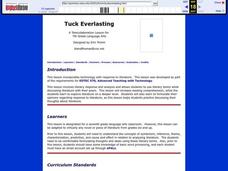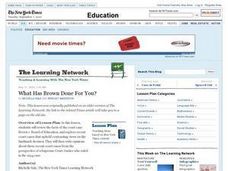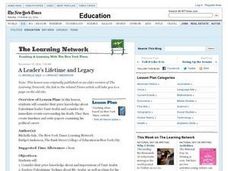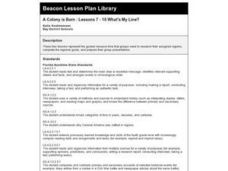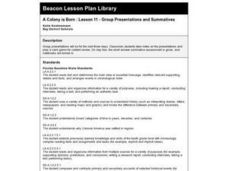Curated OER
The Art of Persuasion-Analysis of Argument
Analyze advertising techniques in order to pinpoint persuasive strategies that writers use. These same techniques are then examined in persuasive speeches. You will have to find your own advertisements, but speeches are included. Finish...
Advocates for Human Rights
Nativism and Myths about Immigrants
Where do anti-immigrants myths come from, and how can they be refuted? Learners critically analyze media reports and how to identify reliable sources. After studying a timeline that details the history of US nativism, groups research the...
Curated OER
Active Reading with American History
Explore connections within and between informational texts with this lesson about encyclopedia articles. Middle schoolers write encyclopedia articles focusing on topics in American history. They discuss how to determine credibility...
Curated OER
Where Do You Stand?
Scholars assess a government's ability to intervene in personal health decisions. They research basic facts about euthanasia and describe their opinions about new legislation passed in the United States Congress about an individual's...
Curated OER
Sounding Off About Impeachment
Help your middle and high schoolers reflect on the responsibility of newspapers to act as a vehicle for 'everyday citizens' to voice their opinions. Then, using an article about the first day of the Senate impeachment trial of President...
Curated OER
Tuck Everlasting
Seventh graders use literary terms while discussing literature with their peers. They explore literature on a deeper level. Students formulate their opinions regarding response to literature, as this lesson helps students practice...
Curated OER
What Has Brown Done for You?
Learners review the facts of the court case Brown v. Board of Education. Next, they research recent court cases that uphold contrasting views on the landmark decision. They write opinions about these recent court cases from a 1954...
Curated OER
Justice Is Blind, Colorblind That Is
It's so interesting to see kids respond to articles about education. To start the day, prompt learners to discuss the words colorblindness and diversity. Then, split your class in two and have one side read an article from 2007 and the...
English Enhanced Scope and Sequence
Research Project Embedded with Media Literacy
Here is a phenomenal language arts instructional activity on media literacy for your middle and high schoolers. In it, learners produce a research product in the form of a public service announcement (PSA). First, they view examples of...
Curated OER
A Leader's Lifetime and Legacy
In this lesson plan, students consider their prior knowledge about Palestinian leader Yasir Arafat and consider the immediate events surrounding his death. They then create timelines and write papers examining his political career.
Curated OER
Your Right to an Attorney
An outstanding lesson plan on a person's right to have attorney's representation in a court case is here for your young learners of the law. Pupils read a lengthy account that spells out the laws regarding legal representation, then...
Curated OER
TE Lesson: I've Got Issues!
Young scholars study environmental issues from different perspectives. They look at the issues from the view of both preservationists and conservationists as they identify themselves with one group or the other. They determine how...
Curated OER
A Colony is Born : Lesson 6 -To Leave or Not to Leave
Fifth graders connect reasons for coming to the New World with identity. The create identities and place them in one of three settled regions. They refer to prior study notes in their Colonial Notebooks to establish their identities.
Curated OER
A Colony is Born : Lessons 7 - 10 What's My Line?
Fifth graders research their assigned regions, complete regional guide and prepare presentations about the New World colonists. They refer to "Everyday LIfe: Colonial Times" as well as searching marked internet sites.
Curated OER
A Colony is Born : Lesson 4 - What Went Wrong?
Fifth graders compare and contrast two early colonies and make a T chart. They list examples of worked well and what did not, and significant historical events. They use higher order thinking skills by deducing how different scenarios...
Curated OER
A Colony is Born : Lesson 11 - Group Presentations and Summatives
Fifth graders give presentations on colonial research. The others take notes on the presentations. They play a card game which helps them review content. They take a summative assessment and present their research notebooks.
Curated OER
The Diary of Col. William Fairfax Gray
Fourth graders examine facts and opinions given by William Fairfax Gray in his diary, compare and contrast ideas expressed in his diary, express opinions using correct language arts skills, and calculate answers to given mathematical...
iCivics
Yeah, But...
Impress upon your young learners the importance of formulating counter arguments based on facts and not opinions. This resource is meant to strengthen arguments designed in a previous lesson, but could also be used as a stand-alone...
Curated OER
The Vaccination Question
Young scholars share opinions about common vaccines, then consider facts and opinions about the HPV vaccine and hold a fishbowl and discussion. They survey members of the community to determine their perspectives on the issue.
Curated OER
Getting to Know the Candidates: Analyzing Their Campaign Ads
Pupils examine the role of advertising in presidential campaigns. They analyze one candidate's advertising campaign ads for elements such as major issues, positivity, negativity, facts, and opinions.
Curated OER
Credible Sources on the Internet: What to Trust, What to Dismiss and When to Cite a Source
Wait, you mean researchers don't all use Wikipedia? Teach your class about intelligent research with a instructional activity about evaluating digital sources. The instructional activity starts with a quickwrite and includes vocabulary...
Curated OER
Men of Steel
Students explore early 20th century steel making. In this U.S. history steel making activity, students view and describe a postcard and a picture depicting exaggerated aspects of the steel industry. Students listen to a poem about Joe...
Museum of Tolerance
Developing Media Literacy
To protect young people from questionable content, many schools limit access. This resource suggests that because learners can so readily avail themselves to unrestricted Internet access, it is vital for 21st century learners to develop...
Curated OER
High School Literary Paragraph Development
You can cover literary elements, writing organization, and proofreading skills in this SMART board lesson. Using student paragraphs from a previous assignment, the class reviews the best examples of writing. A SMART board activity guides...







